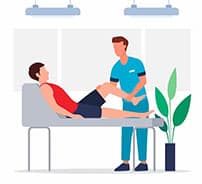With the arrival of the pandemic, 2021 was a challenging year. Right from extended lockdowns, political polarization, and increased workload to natural disasters and daily stress left a lot of people feeling exhausted, leading to fatigue.
Fatigue is a condition that can affect any person regardless of their gender and age. Many people don’t understand what they are going through until it’s too late. Professionals have stated that 97% of workers are at higher risk for workplace fatigue and more than 80% of people have one or more risk factors.
With life being stressful and hectic, it often feels impossible to balance. To add to it, many people also have a ton of social obligations, endless chores, and work tasks. This leads to lingering fatigue.
If you find you are getting tired quite often and wonder why your energy levels are dwindling or even if you feel sluggish all day long, the reason could be extreme fatigue.
When you suffer from extreme fatigue, it can often lead to:
- Headaches
- Sore muscles
- Brain fog
- Dizziness
- Insomnia
- Poor appetite
The senior chief resident Antoinette Price of family medicine at Illinois Hospital describes fatigue as both mental and physical exhaustion that can make it difficult for you to go through daily tasks or even feel drained all the time.
Here are some signs and symptoms to look out for that shed light on fatigue, understanding it, and tips to manage and treat it for the long haul.
Extreme fatigue: more than just a tired feeling

At times, fatigue can be the first sign that something is wrong. While this can rise from a range of medical problems, treatments, or medicines, it can also be due to a stressful life.
Feeling tired and fatigued can often be a result of the following:
- Recovering from major surgery, infections, or treatments
- Illnesses like diabetes, pulmonary disorders, liver disease, and even untreated fibromyalgia
- Sleep apnea, anemia, and taking certain medications for pain, depression, or even antihistamines
The symptoms of fatigue

If you suddenly find that you have less energy to move around, be active, concentrate, or remember things coupled with getting irritable and anxious easily, you may have extreme fatigue.
Some fatigue symptoms can lessen or suddenly become more frequent. This can be related to a range of lifestyle and diet conditions or even medical changes and more. Here are some of the common symptoms you may experience with fatigue.
- Anemia and heart disease For patients who have fewer red blood cells or hemoglobin in their body, oxygen is transported in a reduced manner through your bloodstream. This leads to a drop in the level of energy. Heart disease can also be a culprit in causing your heart to pump blood less effectively which often leads to shortness of breath, making you feel fatigued.
- Not enough sleep Insomnia or sleep apnea can lead to shallow breathing or pauses in your breathing while you sleep. This coupled with an overactive bladder or being overweight can disturb your sleep and leave you feeling exhausted the next day.
- Certain medication Medication can have side effects on your health and certain medications like antidepressants, antihistamines, anxiety medications and more can cause a lot of tiredness at night along with during the day.
- Anxiety or depression Mental health can lead to anxiety fatigue and it’s estimated that 21 million adults in the US suffered from at least one major episode of stress, anxiety, or depression.
Chronic fatigue syndrome: diagnosis and treatments to implement

Chronic fatigue syndrome is an illness that is caused owing to six months of extreme fatigue along with a group of additional symptoms that cannot be relieved by rest.
This illness can often begin with flu-like symptoms along with an episode of emotional or physical trauma caused due to the traumatic death of a loved one, injury, or surgery.
Chronic fatigue syndrome can manifest for numerous months and develop gradually. If left untreated, it can last for years on end, leading many people to never fully recover from it. However, if help is sought and treatment is started, your medical professional can help you work through fatigue and depression.
Testing has found that a lot of people have abnormalities in their nervous system, heart, or common illnesses that can accompany chronic fatigue. This can include a high heart rate, low pressure, and even autoimmune diseases owing to chronic fatigue remaining activated in your system for a long time. Chronic fatigue is said to affect between 836,000 and 2.5 million Americans each year.
Chronic fatigue: The most effective treatment and what to expect
It’s important to know that people with chronic headache and fatigue can easily manage their condition and even have a recovery rate of around 5%. Creating a personalized fatigue treatment plan with your physician is the first step. This can help your symptoms improve or even get better over time, depending on your health conditions and triggers.
The areas of treatment often rely on what the patient is experiencing. Your doctor might start by first treating these issues and then progress to treating the overall illness.
Here’s how to treat chronic fatigue syndrome.
- Cognitive behavioral therapy This type of psychological treatment helps people with chronic illnesses understand and adjust to the way they respond to various situations. It works best for mild to moderate brain fatigue. Your doctor will schedule a few therapy sessions to help you focus on relaxation, helpful behaviors, and thinking techniques to help you.
- Activity management Another effective treatment, activity management is a type of energy management. It is usually carried out by a physiologist or a rehabilitation specialist. You can start by keeping a log of your daily activity, your energy levels, and how it affects you during the day.Your healthcare provider will then look for calming and relaxing ways to help you channel your energy and put it into more productive ways like cleaning, folding laundry, and finding a balance between those activities so that you don’t feel drained out.
- Medications If you experience chronic fatigue, your medical professional might give you various pain and muscle medications to help with any severe sleep issues and pain. They may also prescribe antidepressants and blood pressure medicines to help regulate your mood disorders and ensure optimal blood flow.This might also include treatments to help you get enough sleep if you suffer from sleep apnea or insomnia. It may include a range of treatments and medications to help you get rid of your sleep problems.
- Lifestyle changes Lifestyle changes can include drinking more water, keeping track of your routine through organizers, and calendars, wearing support socks, or increasing your salt intake. Some people are even guided to try meditation, deep breathing, yoga, and other relaxation techniques to help them feel at ease.You can also try various remedies like acupuncture, pain management, and more along with having a balanced diet and nutritional food so that you don’t experience fatigue after eating.
Muscle fatigue: tips to ease pain and discomfort

A lot of people often feel extremely tired when performing tasks or even repeating movements and exercising.
While you might feel strong and energetic at the beginning of your workout, as the session progresses, you can begin feeling weaker which is coined as muscle fatigue. This fatigue over time can lead you to feel exhausted, weak, and tired. It can leave your muscles feeling sore and weak.
Adrenal exhaustion can often lead to nervousness, body aches, and sleep disturbances. Here are some of its main causes.
- Anxiety, depression, and stress
- Age-related
- Chemotherapy
- Hypothyroidism
- Lack of exercise or too much exercise
- Influenza
- Hepatitis C
The symptoms of muscle fatigue can occur anywhere on your body and are as follows;
- Soreness and muscle twitching
- Shortness of breath with localized pain
- A weak grip
- Trembling and muscle cramps
- Difficulty to perform daily tasks
Treating muscle fatigue

Treating muscle fatigue depends on the cause and symptoms of your illness. If you’ve been experiencing muscle fatigue, your doctor will evaluate the symptoms, your medical health conditions, and more before giving you a course of treatment.
Most times, treating muscle fatigue involves resting, staying hydrated, keeping a healthy diet, and ensuring that you have enough nutrition to promote healthy muscles.
Make sure that you warm up before any exercise to loosen your muscles and prevent injury. You can also try heat and cold therapy to lower pain and inflammation. If it does get more severe, your doctor may recommend physical therapy to help you speed up your recovery.
Around 77% of people reported experiencing muscle fatigue as a result of stress, which led to changes in appetite, upset stomach, and headache.
The three types of fatigue according to experts
There are three types of fatigue that vary, depending on your symptoms and each type is classified differently. Each of these types of fatigue has led a lot of people to underperform in their daily lives, leading employers to lose $136 billion a year in health-related lost productivity.
The three types of fatigue are as follows:

1. Social fatigue
This type of fatigue is often felt after speaking to a single person or a group of people for a long time along with going out and meeting people which often requires extra energy. Responding to text messages, calls or even communicating via video calls can be stressful and anxious for some people.

2. Emotional fatigue
Just like the symptoms of adrenal fatigue, emotional fatigue can affect your body. It makes you feel sad, angry, depressed, or irritable for long periods. This can often lead you to feel wiped out and low on energy.

3. Physical fatigue
This type of fatigue can come from any physical activity like going for a run, cooking, exercising, or even doing chores, and is usually caused owing to stress and lack of sleep.
How to test for chronic fatigue syndrome?
Chronic fatigue syndrome, as mentioned earlier, can last for several months and the symptoms can often get worse with more physical and mental activity coupled with no rest.
While there is no X-ray to diagnose this kind of fatigue, most of the symptoms are quite common among people. Some of the symptoms include:
- Trouble concentrating
- Deep tiredness
- Stress
- Inability to stand or walk for an extended duration
If you feel that you have this type of fatigue, consult your doctor right away. They will run some tests like scans, urine analysis, and blood exams to understand what to give you to help you to relax. This allows them to get a better idea of your needs and what you require.
Checking the symptoms
Your medical professional will review your medical history and check your symptoms of extreme tiredness, and fatigue and how long you are suffering from it. Some of the symptoms of fatigue can include:
- Lowered ability to do usual activities
- Feeling dizzy
- Experiencing tiredness
- Problems falling asleep, or staying asleep
Self-care tips: overcome fatigue and feel like your best self
Slowing down and taking some time for yourself is important. It is prudent to remember that self-care isn’t just about face masks and turning your phone off. It’s about feeling more relaxed, deep breathing, eating healthy, and contributing to your overall well-being.
Markus Amann, a professor of anesthesiology, states that if patients can train their minds to respond to muscle signals in a certain way, they can help lower their stress for a longer time.
Here are some top picks to help you boost your wellness routine and mental health that can help lower fatigue in the long run.
- Take a break Taking a break entails so much more than simply stepping away from your screen. It involves taking time out of your daily tasks to ease your stress levels, doing some reading, meditating, and eating a balanced diet to help you sleep soundly later. You should take a break every 30 to 60 minutes and do something else.
- Exercising Instead of doing heavy exercise, why not do some light stretches, take a long walk, or even do some yoga and medication to get your metabolism moving? Yoga can help increase and boost your metabolism and alleviate anxiety and stress, making them ideal for fatigue.
- Good night’s sleep Stress is a normal part of life and people, who deal with stress, can often feel tired and have trouble sleeping. It’s important to take a couple of deep breaths, have a warm bath, and try to let go of sadness and anger so that you can have a better-quality sleep at night.
Different things work for different people
There’s no correct way to fix anxiety and everyone has their causes and symptoms of adrenal fatigue and chronic fatigue. However, finding the right medical professional near you and looking for ways to overcome and manage fatigue can help you in the long run.
Look for a board-certified doctor, who is trained to help provide you with the best options, support your recovery, and help give your tailored care so that you can maintain good health, improve your sleep, and lessen your stress and anxiety.
To schedule an in person on Tele-medicine appointment
please call our office at 1-212-794-8800 or email us at info@patientsmedical.com. We look forward to hearing from you
Our medical center in New York City.
Patients Medical PC 1148 Fifth Avenue, Suite 1B
New York, NY 10128
About Patients Medical
 PatientsMedical.com is headed by Dr. Rashmi Gulati, MD who is a board-certified physician with over 20 years of integrative, functional and internal medicine experience.
PatientsMedical.com is headed by Dr. Rashmi Gulati, MD who is a board-certified physician with over 20 years of integrative, functional and internal medicine experience.Patients Medical is a holistic wellness center dedicated to helping its clients discover health and rediscover vitality. Their physicians combine the best of conventional and holistic medicine with state-of-the-art equipment to provide comprehensive care and treatment to their patients. They focus on the root causes of secondary medical conditions, integrating modern medicine, holistic practices, and natural supplements to fast-track healing and prevent disease. Every year, thousands of existing and new patients continue to visit the center, seeking an alternative medical approach to a variety of health issues.
In addition, Patients Medical provides access to over 15,000 affordable supplements on their affiliated website: www.MySupplements.Store


